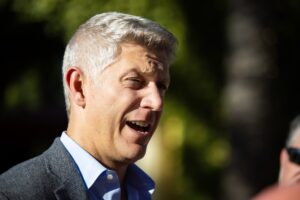
The Orioles have had just four head athletic trainers since they arrived in Baltimore in 1954. With Brian Ebel’s surprising departure from the organization, they’ll have a fifth in 2025.
Ebel, who’d been with the organization since 1985, with the major league club since 1996 and the team’s head athletic trainer since 2018, was widely respected around baseball. In July, he was named as one of the American League’s trainers for the All-Star Game.
At the end of the Covid-shortened 60-game season in 2020, Orioles executive vice president/general manager Mike Elias lauded Ebel for leading the team through the year with minimal disruption.
“I definitely wanted to acknowledge some people that have just done an unbelievable job in making this possible and their counterparts around the league,” he began.
“For us, Brian Ebel, our head athletic trainer who has babysat the entire organization, day and night, through all kinds of issues and work and drama that none of us will ever hear about it. It’s been a tireless and excellent effort on his part and his staff.”
Ebel was a rarity in the Elias-led Orioles. He had been with the team long before Elias arrived, and with his departure, there are not many people remaining.
Only eight players on the 40-man roster or 60-day injured list were in the organization when Elias arrived in November 2018.
Pitchers Keegan Akin, Félix Bautista, Dean Kremer, John Means, Grayson Rodriguez, first baseman Ryan Mountcastle and outfielders Cedric Mullins and Anthony Santander were already in the organization. Means and Santander will become free agents five days after the World Series.
Ebel, who came to the Orioles when Pat Gillick was general manager and assistant athletic trainers Mark Shires and Patrick Wesley, were there, too.
So was José Hernández, who was a longtime minor league coach and promoted to the major league staff when Brandon Hyde was named manager before the 2019 season.
Hernández and three coaches hired under Elias, co-hitting coaches Matt Borgschulte and Ryan Fuller and bench coach Fredi González, also won’t return next season.
Three members of the advance scouting and baseball strategy department — Bill Wilkes, the manager of major league strategy; Ben Sussman-Hyde, the manager of major league video/run creation strategist; and Sam Berk, advance scouting analyst — also won’t return, departures first reported by MASNsports.com.
Wilkes and Sussman-Hyde both worked for the team when Elias arrived.
When Elias spoke on October 3rd, the day after the Orioles were eliminated from the postseason, he signaled that changes would be coming.
“All that I want to say, and can say right now is that I am going to work tirelessly to make adjustments and improve and put us in the position to have a better outcome than we just had,” he said. “My staff and I will not rest this winter, and we will put ourselves in that position.”
Forecasting Elias moves is a difficult task, even after six years of watching him, and while some of these moves are surprising, change was certain.
While Spotrac calculated the Orioles had 1,258 player days missed, only the 22nd highest in the major leagues, three key starting pitchers — Kyle Bradish, John Means and Tyler Wells — had season-ending elbow surgeries.
Just last year, Ebel and his staff received the PBATS Major League Training Staff award.
Since then, the Orioles have been sold, and their new owner, David Rubenstein, has named Catie Griggs as the team’s president of business operations. There have already been changes in her department.
The combination of two disappointing postseasons and an ownership change was an indication of off-field moves.
Next month, Elias can begin making changes to the team that was swept in two consecutive postseasons. He’ll also begin to fill some of the newly vacated positions.
Call for questions: I answer Orioles questions most weekdays. Please send yours to: Rich@BaltimoreBaseball.com